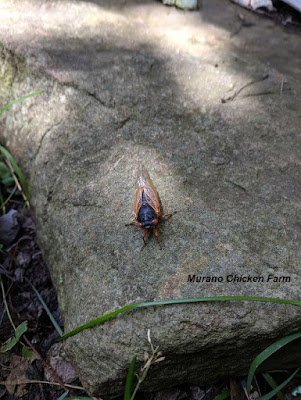Well, she did! But that made me start thinking if cicadas are okay for chickens to eat? Is there any harm chickens eating cicadas? Are they too big? Will chickens choke on a bug that big?
I decided to look it up and found a surprising amount of information on the nutritional content of cicadas. The are high protein, low fat and have no carbs.
People can actually eat cicadas. My Fitness Pal has a section just for chocolate covered cicadas. That's most disturbing thing you'll read today...you're welcome. Of course if you have a shellfish allergy you should abstain since they are in the same family, but I digress. Obviously chickens can eat cicadas too.Chickens eating cicadas
The freakiest part of chickens eating the cicadas is that some chickens eat them in one bite. They are rather large. The mature insect is up to 2" in length and the nymph is about 1" long. They are also rather thick, which leads to the puzzlement of chickens eating these things in one gulp!
Other chickens rip them apart to eat them, or even fight over them which of course breaks them into smaller pieces. They are just as edible as any other insect your chickens like to eat. Like earwigs.
Here's a quick overview of the cicadas life after it emerges from the ground: The cicada nymph emerges from the ground looking like an odd brown beetle or a grub with legs and has a soft shell. They usually emerge overnight. The shell then hardens. You will see these things crawling around....The cicada will suddenly stop wherever they are and molt. They sort of just pop out of the shell through the back, leaving the empty shell clinging to whatever they were crawling on.
They are pale colored and soft but now have wings. The whole insect turns darker as it dries and hardens. It's body becomes almost black and it's wings become a dark brown. It now looks more like a giant fly with extra long wings.
They live and breed for several weeks then die off. They lay their eggs on a tiny end of a tree branch and when they hatch, they break through the tree branch and drop to the ground below.
This causes the branch end to hang down and die. Since the branch is only broken on one side it does not fall off but the leaves die and it just sort of hangs their. This is called flagging.
Once their eggs hatch, the nymphs burrow underground then emerge in 17 years. Of course there are different types of cicadas with different lifespans, but the information I'm providing on chickens and cicadas applies to all of them.
The chickens can and will eat cicadas at any stage in their lifespan. On occasion I've dug them up while gardening and have tossed the immature nymphs to the chickens and they devour them.
If your chickens are eating cicadas:
- Do not spray the cicadas with bug spray. If the spray does not kill them and the chicken ingests the bug, the pesticide could still affect the chicken. Or worse yet, the spray will be strong enough to kill the cicada and the chickens will eat the dead bug, thereby ingesting the pesticide.
- Make sure the chickens have adequate grit. The wings of the cicadas are hard and will require grit to digest properly. Provide a bowl of grit even if they free range unless you are positive they have access to enough small stones, not just sand and dirt.
- Make sure your chickens have access to clean, fresh water. They're going to need it to wash down these giant bugs!
If you chickens happen to enjoy eating cicadas and you are encountering a lot of them you can save them for later.
Throw them into a freezer bag and pop into your freezer. Thaw out when you want to feed them to your chickens. They will be dead at that point (obviously) but your chickens should still enjoy them.
There's a really good chance that you don't have cicadas this year. That doesn't mean they're not going to hit your area though! Here's an interesting list of when the 17 and 13 year cicadas are set to hit various parts of the central and eastern US.There are also annual types of cicadas you might see, but they aren't as much of an 'invasion'.
Want more information on what chickens can and can't eat? Click over to read all my posts on feeding chickens!~L
Want information on raising chickens sent right to your email weekly? Click right here to join my list and get new posts sent directly to you the day they're published ... plus, you'll also get the 4 free downloads including '25 Ways to save money raising chickens'.




As I understand, the cicadas don't have a mouth or stinger and can't hurt you. We always know that summer is here when the cicadas start buzzing. It's a relaxing sound.
ReplyDeleteThat's a common misconception but only half right...cicadas do not have a stinger. They do have a mouth and they spend their underground years drinking sap from tree roots, so it is possible for them to bite you...they just won't...unless you look an awful lot like a tree or plant! lol You must live where the yearly cicadas are. I don't think I've seen any of those here, I know what you mean about summer sounds though! Ours is the whippoorwill. When they start calling,it's definitely summer!
DeleteLisa
Also, cicadas are a favorite delicacy of copperhead snakes that will climb trees in order to get to them. Maybe they're tasty. You first.
ReplyDeleteWow, that is fascinating and scary all at the same time. Someone I talked to said they taste like bacon. I think I'll pass! lol
DeleteLisa
Hello can chickens and chicks eat cicada shed?
ReplyDeleteThey can since it's just an empty bug shell. They usually won't though...no idea why.
DeleteLisa